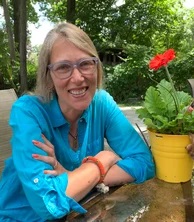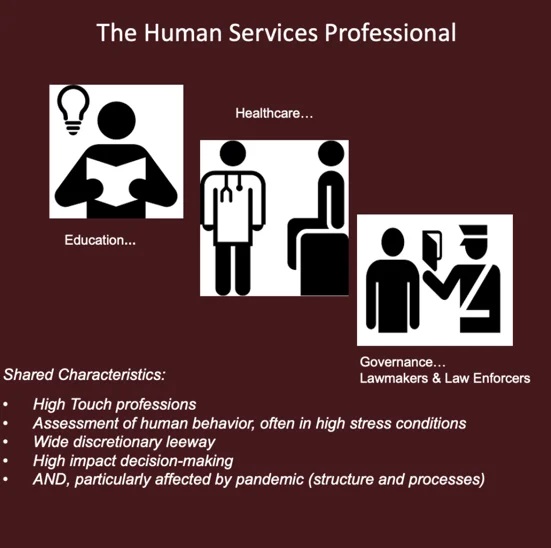

Anna Gersh
"After the pandemic, we need new solutions to old problems," says Anna Gersh, Ph.D, the instructor and creator of a brand new course at EMU PPAT, The Human Services Professional.
The course seeks to create an environment where members of highly consequential public-facing professions such as law enforcement, education, and healthcare learn not just from the content of the course, but from each other and shared experiences as well.
"I wanted to create a course for all types of public-facing professions," explains Dr. Gersh "that created an opportunity for workers to deeply examine the point of service moment — the moment when we first come in contact with the people we serve."
The Human Services Professional course combines lessons on applied research, interpersonal communication, and group process skills over a highly interactive 12-week course that provides participants with an inquisitive and analytical approach to those they serve daily.
Who are Human Services Professionals?
"This would be a great lab class for anybody who's interested in improving service quality in their job," says Dr. Gersh. "It gives you an opportunity to think deeply about who you are as a service person, and who you're serving. It's about creating public forums within the classroom context, for the discussion of 'What are we trying to accomplish in service?'"
Solving the problem of how public-facing service professionals better perform their job has been a longtime professional pursuit for Dr. Gersh. In some ways, the Human Services Professional class is a culmination of the lessons she learned during her own 30 years of service to her community. Dr. Gersh's career includes classroom education, overseeing afterschool programs, kickstarting art organizations, and even serving on a task force to create the Ann Arbor Independent Community Police Oversight Commission.
While working in the public forums that helped determine the powers of the Oversight Commission, Dr. Gersh worked on a paper that would become the foundation of the Human Services Professional course and philosophy.
"I discovered that there were a lot of similarities in these human service fields," explains Dr. Gersh. "The experience of human service work is very personal - it's almost impossible to communicate to someone outside of the field what it's like to work directly with individuals as the main focus of your job. And so it's easy to feel, as a worker, that no one can understand what you go through on a daily basis. This feature is common to all human service professions and particularly problematic in the target professions, what I call the "problem-prone professions". This is why the course draws heavily on best practices in those fields."
"The longer I worked on the paper, the more I realized the [police] have similar things they have to deal with, in terms of having to engage, so they don't have to lean on domination. The same is true in education. You have to engage so you don't have to lean on punishment. In healthcare, you have to engage people in their own healthcare, or you have less desirable outcomes."
"I started seeing all of these connections...and I came up with a definition. The human services professional is the result of a fully implemented set of professional standards for workers whose labor entails high impact decision-making and wide interpretation of human intention, behavior, and circumstances."
The first segment of Dr. Gersh's Human Services Professional course showcases the connections between those various fields with guest speakers from the education, healthcare, and law enforcement fields.
Bringing in different perspectives and experiences on shared challenges supports one of the course's goals of helping students approach their professions with a curious mind, rather than a suspicious one through familiarity with one's community.
"The brain functions in protective ways," explains Dr. Gersh. "And so it tends to meet difference with suspicion. What we need to do is to start helping our brains learn that difference is exciting and difference should trigger curiosity, not fear."

A Curious Mind is an Analytical One
In all walks of life, curiosity leads to questions, as individuals hope to gain a better sense of their surroundings. The Human Services Professional's second segment is built around providing participants with applied research techniques so they can develop a deeper understanding and awareness of the demographic makeup of their region of service.
While this summer's course will be the pilot for the Human Services Professional, the applied research segment originated from a group known for their curiosity.
"My background is in education and so I thought, 'Wouldn't it be great to get some kids to work on this problem with me," Dr. Gersh recounts. "I started asking all my teacher friends, and by the end of the summer I had 6 kids that wanted to work on the problem, which was: what does a doctor, teacher, or police officer need to know to be good at their job?"
Dr. Gersh then spent 6 months working with an economically and regionally diverse group of kids to co-create a survey. They returned with results as diverse as the communities they collected from.
"I said, "Take this survey out to your different environments and collect some data and we'll come back and analyze it. Let's find out what people need to know and then let's make a professional learning course that can serve this problem."
The Human Services Professional course will include a similar research project, built around solving a student's question in their unique service region. To help facilitate sound research practices, a guest speaker librarian will help lead a guided practice on informational databases. But which question the students decide to solve is up to them, with a collaborative environment meant to spark discussion.
"We'll help each other articulate meaningful research questions," says Dr. Gersh, who spent nearly seven years as a research specialist at Wayne State University and the David P. Weikart Center for Youth Program Quality.
Dr. Gersh's group of youth eventually shared their findings at the One Love Symposium, a public forum co-created by Dr. Gersh and Dr. Jennifer Pollard from the University of Michigan, where community members, such as Law Professors from the University of Michigan and Washtenaw County Sheriff's Department police, gathered to discuss how to tackle the challenges of the human services professional.
"[The One Love Symposium] attracted people because we offered an opportunity to examine the values around human services work. They understood it's important to examine one's values if one's job involves decision-making for strangers."
Values of the Human Services Professional
Equipped with a better understanding of the demographics of their region of service, and new perspectives on how other human services professionals interact with the public, participants will then explore key cultural, social, and status differences among service providers and resource seekers and how those impact how we behave at the point of service moment.
"If you want to become an optimally useful service person, you need to know who you're serving," says Dr. Gersh. "Not only should you have some communication with your region of service, but you need to be clear about what your values are. The final project in the course is a personal ethnography. This is an opportunity to look at who you think you are as a service person. What are your values?"
"Part of this final section includes a look at philosophy. There are a lot of great minds all over the world and throughout time who have tackled the problem: of how we should treat one another. That's worth having a conversation about. So, this course is really a series of experiences that allow you to investigate your region of service and through that investigation, you can develop a deeper and more optimally useful approach to service."
The Point of Service
Human Services Professionals have countless interactions with the public on a daily basis, and each of those interactions is as unique as the individuals involved. The Human Services Professional course seeks to provide a framework for approaching those interactions with an open and educated mind and to remind ourselves that these positions are ultimately about helping the communities we live in.
"I'm excited about the possibility of different people in different capacities and with different interests coming together and having a public forum," says Dr. Gersh when asked what she's most excited about in the upcoming class.
"This is my life's work, bringing people together, who in the outside world are separated by caste-like differences, into this environment where they're all experts."
"The police officer who works road patrol, the surgeon who has to give a cancer diagnosis, and the 18-year-old server at the local bar, are all dealing with individuals coming in and they are responsible for communicating with them. That point of service moment is really important. That's what this course is all about, the point of service."
"What we know now is that there are a million micro-decisions going in the head of both the patron and the resource provider, that say I know how this is going to go, happening at lightning speed. This course is about unraveling what happens at the point of service, and my hypothesis is that if you do the leg work to learn about your environment, your region of service first, you're going to function better as a service provider at that point of service moment."
To register for The Human Services Professional course or to learn more about future offerings, visit EMU PPAT today.
